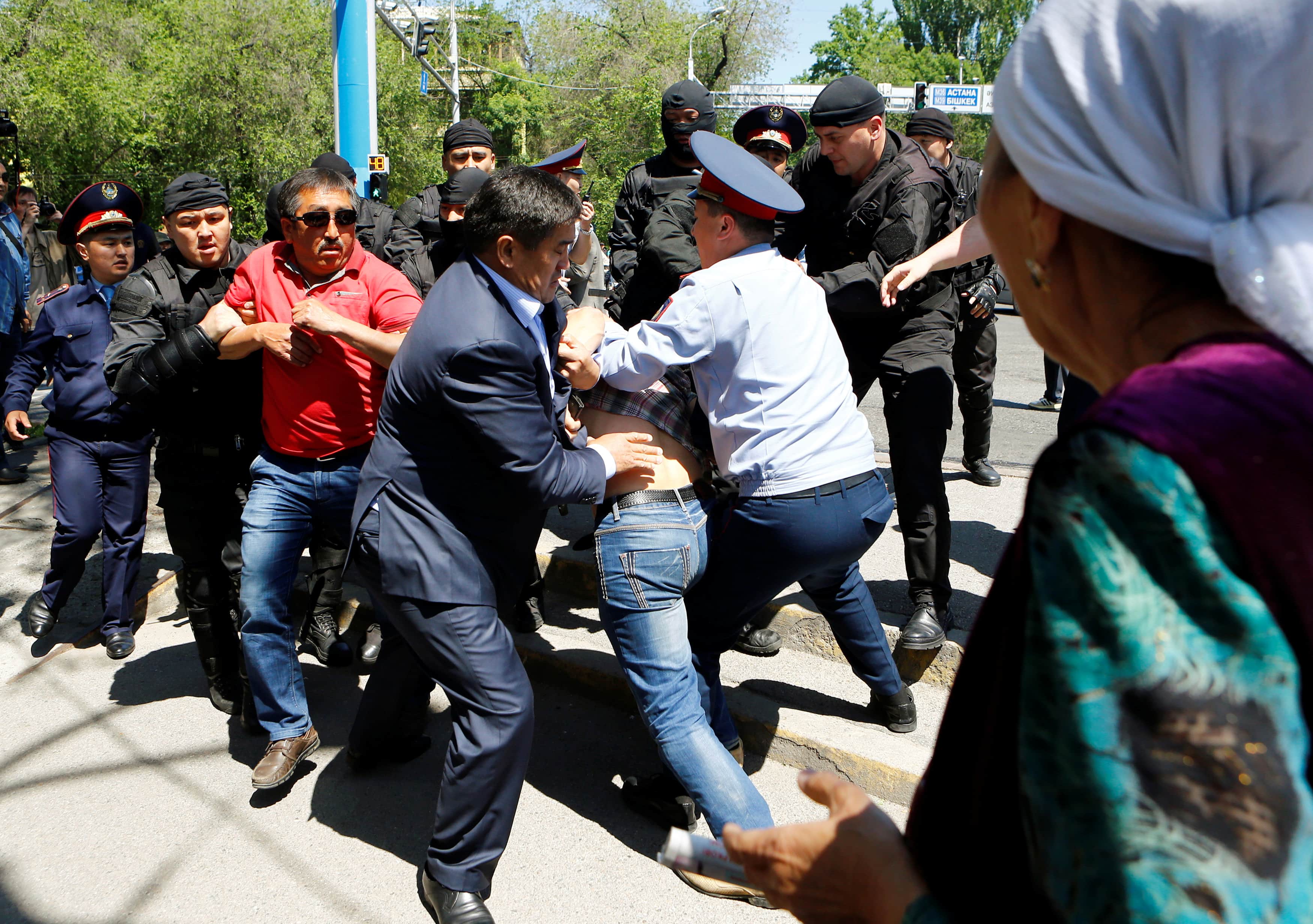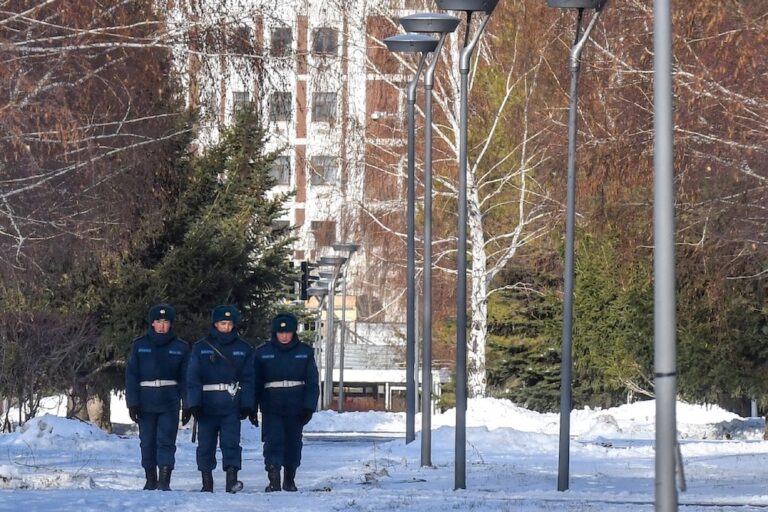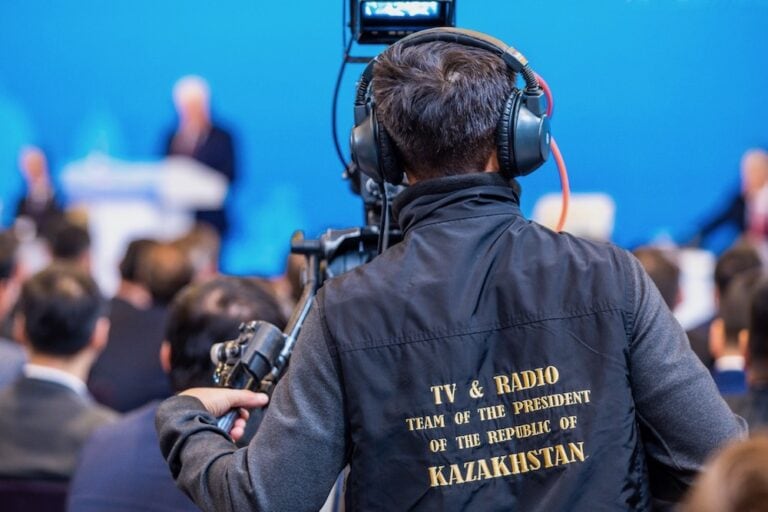Hundreds of people in Kazakhstan rallied in April and May against proposed land reforms that would extend from 10 years to 25 years the time for which foreigners could lease land in Kazakhstan. Maks Bokaev and Talgat Aya – the activists on trial – had leading roles in one of the largest protests.
This statement was originally published on hrw.org on 11 October 2016.
Two land rights activists will go on trial in Kazakhstan on October 12, 2016, on unfounded criminal charges stemming from a peaceful protest, Human Rights Watch said today.
A court in Atyrau, western Kazakhstan, will hear the case against Maks Bokaev and Talgat Ayan on charges of “inciting social and national discord,” “disseminating false information,” and “organizing an illegal protest.”
The criminal prosecution of activists for exercising their right to peaceful protest has no place in a society that respects human rights and rule of law, Human Rights Watch said. The authorities should halt the trial immediately and free the two men.
“Maks Bokaev and Talgat Ayan should not be facing prison time for peacefully exercising their right to protest or for encouraging others to do the same,” said Mihra Rittmann, Europe and Central Asia researcher at Human Rights Watch. “Expressing a negative opinion about government policy is not a crime.”
Bokaev, 43, is a well-known activist, outspoken on a range of issues, including human rights and the environment. He is a member of the Atyrau regional National Preventive Mechanism, a torture prevention monitoring group under Kazakhstan’s Office of the Ombudsman. Ayan, 32, is another Atyrau-based activist who has actively opposed proposed amendments to the land code.
Hundreds of people in Kazakhstan rallied in April and May against proposed land reforms that would extend from 10 years to 25 years the time for which foreigners could lease land in Kazakhstan. Protesters were concerned that long-term leases could result in the effective loss of Kazakh land to foreign investors. Bokaev and Ayan had leading roles in one of the largest protests in Atyrau on April 24. Bokaev had formally requested permission to hold the protest in accordance with Kazakhstan’s restrictive law on public assemblies, but permission was denied.
Human Rights Watch reviewed the indictment against the men, which does not cite any material evidence that the men were planning violence. They each face up to 10 years in prison.
The indictment, dated September 26, says that Bokaev and Ayan are accused of “criminal acts against the peace and security of mankind, public safety, public order and order management,” and of “willfully acting against the national interests of the Republic of Kazakhstan and creating threats to the Republic of Kazakhstan’s national security” by organizing a public protest against land reform proposals.
In particular, the indictment states that Bokaev, acting with Ayan, by requesting permission to hold a protest on April 24, “allow[ed] for the possibility of inciting social discord, destabilizing the social and political situation, disturbing public order, and causing significant damage to the rights and legitimate interests of citizens, organizations, and legally protected interests of society and the state.”
The indictment also states that in advance of the April 24 protest, both Bokaev and Ayan used social networks, including WhatsApp and Facebook, to disseminate false information about land reforms and to encourage Atyrau residents to attend the April 24 rally, with the aim of “forming negative opinions, which contained a negative emotional assessment and formed negative attitudes toward a social group (parliamentary deputies, regional heads), [and a] professional group (law enforcement officers and special bodies).”
Ayan is also accused of receiving money from a businessman from southern Kazakhstan, who is separately on trial in closed proceedings for acts “aimed at the forcible overthrow of power.”
The indictment says that based on complex psychological and linguistic assessments commissioned by the authorities and carried out in May and July, both Bokaev’s and Ayan’s Facebook posts contain elements of inciting social discord. The July assessment concluded that Ayan’s posts “formed…a negative attitude to representatives of government, law enforcement and special operations, and therefore contain an appeal aimed at inciting social discord.”
Bokaev and Ayan were initially detained on May 17, along with over two dozen others across Kazakhstan around that time, and sentenced to 15 days in detention for allegedly violating the law on public assemblies.
Before they were released, authorities brought charges of “propaganda or public calls to seize or retain power, as well as seizure or retention of power or forcible change of the constitutional order of the Republic of Kazakhstan” and “preparing for a crime,” and transferred them to pretrial detention. In June, the charges were amended.
Prosecuting Bokaev and Ayan for holding and expressing negative views about the government’s initiative to amend the land code is a clear violation of Kazakhstan’s international human rights obligations, Human Rights Watch said. Kazakhstan is a party to the International Covenant on Civil and Political Rights, which guarantees the rights to freedom of expression, association, and assembly and the authorities’ actions around the protests and the prosecutions demonstrate scant respect for any of those rights or their obligations.
The vague criminal charge of “inciting social discord” has come under concerted criticism in recent years, including by local and international human rights organizations, the United Nations Human Rights Committee, the European Parliament, and the OSCE media freedom representative.
“Kazakh authorities should stop misusing vague criminal legislation to target government critics,” Rittmann said. “Bokaev and Ayan should be freed.”



